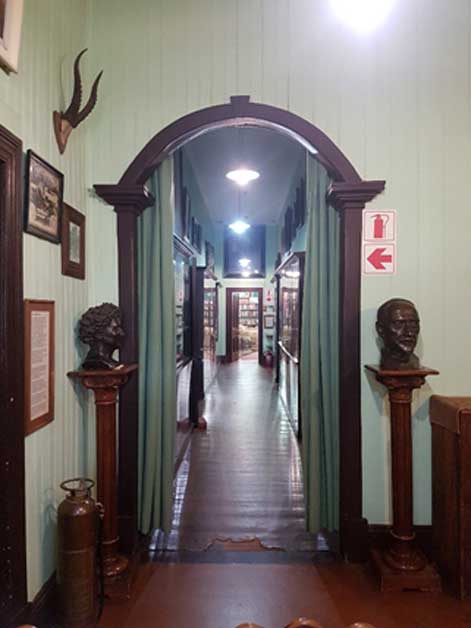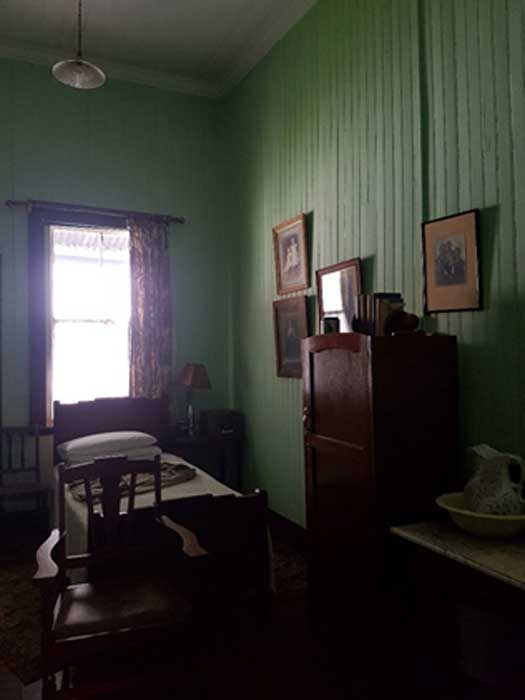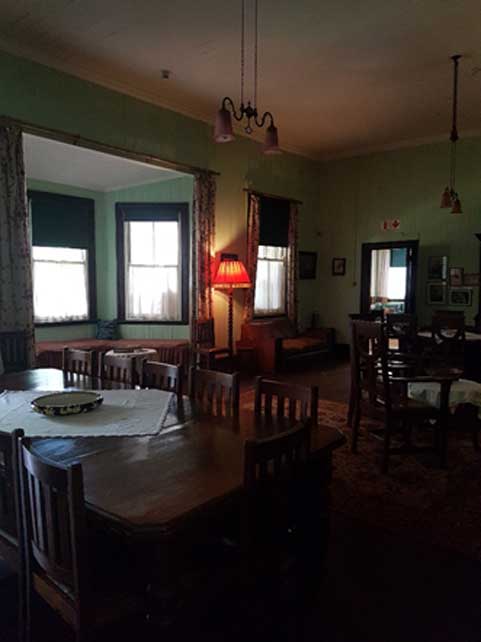
Former Home of South African Statesman Rumored To Be Haunted
The farmstead of General Jan Smuts on the outskirts of Pretoria, South Africa is reputed to be one of the most haunted private homes in the country, according to Mr. Mark Rose-Christie, raconteur and social scientist, who regularly takes brave visitors on a tour of haunted sites on his mystery ghost bus.
Mark Rose-Christie introducing an apparition experienced by a journalist in the house.
A Brief Biography of General Jan Smuts
Jan Christiaan Smuts was born in 1870 in Riebeeck West, South Africa. He graduated in law from Cambridge and was appointed as State Attorney of the Zuid Afrikaansche Republiek by President Paul Kruger in 1898, a year before the outbreak of the Anglo-Boer War.
In 1919 he became Prime Minister of South Africa and in 1939 he led South Africa into the Second World War. In 1941 he was appointed Field Marshall by King George VI and in 1943 he resided over the British War Cabinet, while Churchill met with Roosevelt and Stalin in the Middle East.
He died on his farm Doornkloof in 1950. A century after his birth, in 1970, Lord Todd, Master of Christ’s College, Cambridge stated that the College was proud of three outstanding students in its five hundred year history: namely John Milton, Charles Darwin, and Jan Smuts.
History of the Haunted House
Jan Smuts acquired a portion of the farm Doornkloof, just south of Pretoria, from the Erasmus family in 1908 at a cost of £900. The house, a wood and iron building, was originally prefabricated in Britain, shipped to India and reshipped to South Africa, where it served as an officers’ mess for British soldiers in the town of Middelburg.
After the war, Smuts bought the house for €300 and had it transported by rail and ox wagon to his farm Doornkloof in 1909. His wife, Mrs. Isie Smuts and their children moved in, while General Smuts was in England on state business.
- Annie Palmer, the White Witch of Rose Hall
- Loftus Hall: Most Haunted House in Ireland Has Not Revealed All Its Dark Secrets
- Queen of Sweden Says Her Old Palatial Home is Haunted by Friendly Ghosts

A dark passage extends from the haunted dark room to the old billiard room, which General Smuts converted into his study and library.
A Ghost in the Library?

The parlor was the heart of the home, where besides children and grandchildren, many famous persons were entertained by Mrs. Isie Smuts playing her piano.
After several years of matrimony and raising seven children, General Smuts and his wife decided to occupy separate bedrooms. Smut’s unpretentious bedroom was located right next to the library, but he often preferred sleeping on an iron bedstead on the veranda outside, with his Greek testament next to the bed.

General Smuts preferred sleeping outside on the veranda.
Royal Guests in Jan Smuts’ House
Leading from the parlor was the Best Guest room, where British and Greek royal families were hosted during their visits to Doornfontein.

Royal guests slept in this bedroom.
Jannie Smuts, one of the sons, recalled his memories of the old house:
“In summer the house was hot and in winter bitterly cold, with water freezing in the bedroom jugs, and chilly draughts filtering through the walls… Wild bees discovered the virtues of the house, and numerous swarms made hives in the partitions between the wood and the iron… so at the cost of occasional painful stings, we have had an inexhaustible supply of honey within the walls.”

The dining room where the family would have enjoyed the honey. Mrs. Smuts apparently hid important documents in the bamboo curtain rods.
Family Bedrooms and War Rooms
Grandmother Isie Smuts’ equally unpretentious bedroom was located close to the children’s wing, which is today converted into the war rooms, displaying documents of General Smuts’ illustrious career as a statesman.

Photos of President Paul Kruger, Mrs. Smuts’ brothers and sisters, her children, and her husband adorn Mrs. Smuts’ bedroom.
A new kitchen and pantry were added in 1918 but Mark Rose-Christie reports that someone still uses the old kitchen to this day.
Rescuing the House from Dooming Ruin
General Smuts died in 1950 in the house and his wife Isie passed away in the house in 1954. The widow of one of the sons, Mrs. Kitty Smuts, inherited the big house, but she could not maintain it. Members of the Smuts family removed furniture, sentimental objects and Smuts’ documents and donated them to various institutions.
Mrs. Kitty Smuts sold the property and 25 morgen of land to Mr. Guy Ashley Braithwaite, who endeavored to save the home as a memorial to the Smuts couple and Smuts’ ideals. He wanted to preserve the heritage for “hundreds and thousands of men and women in Great Britain, the United States, the Commonwealth and Europe who have been brought up to regard Smuts as one of the great men of the 20th century… they will be prepared to make a pilgrimage to Pretoria just to visit the old house.”

A statue of General Smuts in the garden.
The Current Owners: General Smuts Foundation
A non-profit company, the General Smuts War Veterans Foundation was registered in 1960 to administer and preserve the house and it was declared a National Monument in 1969. The General Smuts Foundation invites the public to join the Friends of the General Smuts Foundation, a voluntary organization dedicated to supporting the Museum in practical ways as well as fundraising.
In 1964, fourteen years after the death of General Jan Smuts, his friend Sir Winston Churchill and Earl Attlee, made a plea in The Times to raise funds to preserve the house:
“Doornkloof is a simple wooden farmhouse which has remained as Smuts left it, with the wild gardens he designed. We believe that the people of Britain may wish to share in a memorial to Smuts by contributing to a fund to preserve Doornfontein in memory of this man who shone among his contemporaries, was a devoted friend of this country, and whose counsels and initiatives in war and peace were on a high plane of statesmanship and humanity.”
The Gardens
Sir Winston Churchill refers to the wild garden that General Smuts had designed and today the Smuts Koppie Grassland project also provides a safe haven for several animal and bird species, but unfortunately the herds of antelope that once grazed here have vanished. General Smuts, who had a degree in botany, also maintained an herbarium on the grounds. A hiking trial also passes the ruins of the “bywoners” (poor white laborers) cottage and their graves, another spot for Mark Rose-Christie’s ghosts.
The gardens were a great source of inspiration for General Smuts:
“The homecoming to Doornkloof was the best… Isie and the children were great, and Doornkloof was a dream. And the air, and the nights and the days! I have simply plunged into it all with my heart, and it is soaking into me like a blissful opiate, and making me forget the great world of sorrow and suffering I have left behind me.”
- World’s 8 Most Haunted Castles: The Lost Souls Tormenting Visitors of Famous Bastions
- Brave Enough To Spend A Night in England’s Most Haunted Prison?
- Is the Island of Dolls Haunted? An Eerie Tribute to a Little Mexican Girl
Restoration of the Museum
Over the years the house was restored and much of the original furniture and artifacts were retrieved and donated by the offspring of the family. A curator was appointed in 1992 and in 1995 the library was returned by Wits University and the room was restored to its original status.

Upon restoration, the library books were returned and arranged in their original order on the shelves.
For more information, visit www.smutshouse.co.za or email [email protected]
All photos courtesy Micki Pistorius.
Updated on May 26, 2021.
References:
Mark Rose-Christie www.mysteryghostbus.co.za
The General Smuts Foundation: Information series, no 6. History of the Big House Doornkloof
The General Smuts Foundation: Information series, no 1. Jan Christiaan Smuts 1870 – 1950 A Chronology
The General Smuts Foundation: Information series, no 3. The Smuts Koppie Grasslands.














